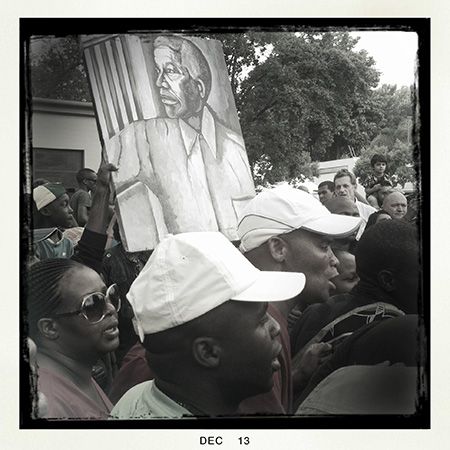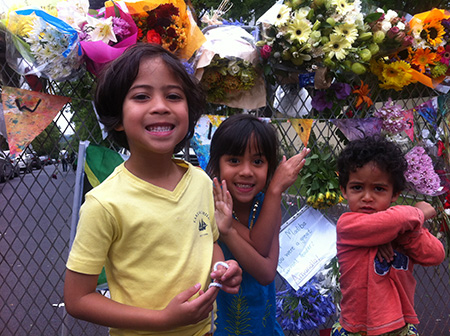
Outside Nelson Mandela’s residence in Houghton, Johannesburg. Photo by Nadia Tromp
The trumpet cries, fading into nothingness, then strong again, as the crowd heaves and sways to the sounds of “Nkosi Sikelel’ iAfrika” (“Lord Bless Africa”). It is the day after the announcement to the world that Nelson Mandela has passed. Our Madiba has finally been allowed to pass. The world’s Madiba.
We have come to pay our last respects. My children tug excitedly at my sleeves. The bursts of color of the bright bouquets left by mourners line the streets. The little ones each find a spot to lay down the small bunch of wild flowers picked from our garden. They have heard the stories of Nelson Mandela and the important sacrifices he has made for our freedom, but they are too young to understand. The twins are 4 years old and Mika’il barely just 3. In the broken vocabulary of a 3-year-old he utters a whisper, "We love you Madiba." My eyes burn and the knot in my throat presses, but I hide this face from them. It is important to me that they remember Nelson Mandela in celebration of his life. The carnival atmosphere in the streets outside Madiba’s residence in Houghton, is contagious. People of all walks of life, age, creed and color are there to pay their last respects. Strangers swap stories of how Tata Madiba impacted their lives. Foreign and local press sprawled across the sidewalks, typing away frantically, like good little worker bees, each trying to capture the spirit of Nelson Mandela in the words spoken by those left behind. It’s not hard to do. He had a profound effect on people, making every individual feel the importance of their contribution to our democracy. He invoked the confidence in us all to believe that each voice matters. He gave us the freedom to dream and to believe that our aspirations are important and achievable.

Qaim, Zorina and Mika’il Tromp outside Nelson Mandela’s residence in Houghton, Johannesburg. Photo by Nadia Tromp
As my eye drifts over the mass of people, I am overwhelmed by the love and common thread of respect for a great man. My thoughts drift to Madiba. When I think about him, I think about the essence of forgiveness. To truly forgive when another has hurt you so deeply takes great courage and love. He was forced to live 27 years without his family. Unable to be a husband to his wife or a father to his children. Robbed of the little moments in their development and the big moments in their lives as they grew. So many memories missed. The privilege of being a father, a constant, all-important figure in his children’s lives, molding them into the people they would become, taken away from him forever. A void that can never be filled. Yet he remained strong and forgave. He encouraged us to forgive those who hurt us intentionally or unintentionally, whether they asked for forgiveness or not. This is a hard lesson to learn and one you can only begin to understand once you find yourself in that place of hurt. Madiba understood that it is only in forgiveness that we can free ourselves. I am challenged by this truth. One can only heal by accepting this truth. Standing there, with my children’s tiny hands in mine, I take a vow to honor my Madiba’s memory, by learning to forgive, when it is the most difficult thing to do and without expecting anything in return.
My head is bobbing to the tune of Bob Marley and the Wailers, “Redemption Song” playing in my head, "Emancipate yourself from mental slavery, none but ourselves can free our minds." I smile. I am grateful for the lessons learned, it gives me strength. I am free to dream, free to live, free to love. I am free.
Thank you Tata Madiba, hamba kahle (“go well”). You will live on in our hearts and minds.
Nadia Tromp is a ’13 Nieman affiliate.

